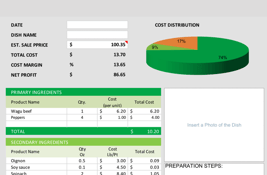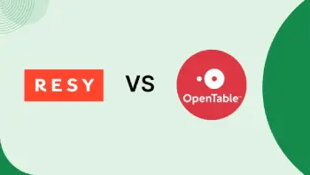Successful winery management requires a wide variety of skills, from the vineyard to the tasting room.
It’s important to stay flexible. When the year throws you something different in terms of vine development, don’t manage it strictly by the calendar.
Therefore, prioritizing a proactive management approach is important not only for profitability, but also for guest satisfaction.
In fact, studies show that for over 89% of businesses, customer experience is the key driver of customer loyalty and retention.
This article will discuss how strategic practices and careful planning can help winery managers improve operations, boost revenue, and elevate guest experiences throughout their operations.
But first, let's take a look at the role / general job description of a wine manager.
The role of a winery manager
%20(1).webp?width=580&height=326&name=Eat%20(36)%20(1).webp)
As the manager of a winery, you are responsible for overseeing all aspects of the operation.
Your duties include managing wine grape growth, wine-tasting tours, increasing revenue, guest experience, making strategic plans and decisions, understanding various techniques for processing grapes, and determining the best time to harvest.
In this role:
- You need to move beyond just being a winemaker to become an effective team leader.
- Building trust among your team members is important in creating an open line of communication.
- Providing every guest with a positive tasting room experience is essential.
- Maintaining healthy vines through tasks such as irrigation management, pest control against diseases or insects, and pruning greatly impacts wine quality.
The duties and requirements
A deep passion for wine is important in this role. It’s also recommended that wine managers need a two- or four-year viticulture degree to gain knowledge on all aspects related to running a successful winery.
This education will prepare them not only for overseeing vineyards and producing exceptional wines but also for offering tours and creating engaging experiences for guests at the winery.
The difference between a winery and a vineyard
.webp?width=624&height=356&name=33b1f83a-8712-4f74-8a9f-ed131cdc9edf%20(1).webp)
The process of making wine involves both a winery and a vineyard, which are two completely different entities.
A winery is a licensed facility that specializes in producing wine while a vineyard refers to an area of land where grapes are grown.
Some wineries, such as Chateau Grand Traverse, have their dedicated vineyards known for growing ‘estate-grown grapes’ used in their wines.
The team responsible for maintaining the vines plays an integral role in the overall success of the winemaking process by ensuring a consistent supply of ripe fruit - essential for crafting high-quality wines.
Expert tips to manage a winery
%20(1).webp?width=580&height=326&name=Eat%20(37)%20(1).webp)
To embark on the journey of a winery manager, more than just having an enthusiasm for and expertise in wine is required.
It calls for a strategic approach to various aspects of the business to ensure efficient operations, profitable growth, and exceptional experiences for guests.
These include creating a thorough business plan, overseeing vineyard processes, supervising staff members, understanding clientele preferences, and personalizing their visits while managing waitlists.
To succeed in managing a winery, use smart tactics, keep talking with your team, and come up with new ways to make more money.
1. Create a business plan
Just as a vine needs structure and direction through a trellis, the success of a winery depends on having a strong business plan.
This serves as a guide for setting objectives, tactics, and financial predictions while providing an organized approach to managing operations.
An effective winery business plan should cover key areas such as:
- Summary of company goals
- Overview of the business
- Analysis of market trends and competitors
- Strategies for obtaining financing
- Marketing plans
It's also important to conduct a SWOT analysis to assess the strengths, weaknesses, opportunities, and threats that may impact the winery’s performance in its respective market.
2. Oversee vineyard operations
Running a winery includes more than just the tasks carried out in the cellar or tasting room.
A major responsibility of vineyard managers is overseeing operations in the vineyard and the restaurant, including duties such as winter pruning and managing growth during spring budburst.
During summer months, canopy management becomes essential for maintaining healthy grapevines.
And come autumn, harvesting must be carefully executed to ensure top-quality grapes are produced.
Efficiently running a vineyard plays an important role in achieving this goal by reducing waste of resources and utilizing technology for data management and workflow optimization.
3. Staff management
In the winemaking process, careful attention is not only given to the grapes but also to the people involved.
Managing staff effectively is a crucial aspect of winery management and includes tasks such as hiring skilled individuals and providing training while creating schedules.
The qualifications for those working in a winery cover a diverse range of abilities including following verbal instructions, maintaining professionalism, and having a passion for wine.
Implementing efficient scheduling methods can have positive impacts on cost reduction and productivity growth within the winery industry.
Further reading
4. Understand who your guests are
A winery manager’s understanding of their guests goes hand in hand with their knowledge of wines. It's important to understand the preferences, tastes, and overall satisfaction factors of each guest.
With this information, a personalized and memorable experience can be customized specifically for them.
Creating detailed customer profiles for your winery goes beyond just knowing names and faces.
It means understanding what each guest likes. By using tools like Eat App, you can learn important details about who comes to your tastings, their favorite wines, and where they prefer to sit.
This helpful information lets you customize their experience, suggest wines they'll enjoy, and improve their happiness, which could lead to them spending more and becoming loyal customers over time.
Further reading
5. Personalize your guest experience
In today’s world where guests seek out one-of-a-kind experiences, the act of personalizing a guest’s visit to your winery can set you apart from competitors.
This not only adds value to their overall experience but also leads to positive reviews, an enhanced brand reputation, and increased revenue.
There are various creative ways in which a winery can personalize the guest experience, including collaborating with local chefs for curated menus at wine pairing events, encouraging guests to engage all their senses during tastings, and incorporating unique characteristics of the winery into the entire guest journey.
Further reading
6. Manage guest's expectations with waitlist management
Operating a winery involves more than just vineyard or cellar activities; it also requires managing guests’ expectations, particularly regarding waitlists.
Effective waitlist management for your wine-tasting room can help reduce frustration and improve overall satisfaction.
Recommended best practices for establishing a waitlist system in a winery involve clearly defining the waitlist policy, managing guest expectations, and maintaining consistent communication through email and text.
Keeping guests informed throughout their wait and offering the choice for guests to receive a call back can greatly enhance the guest experience.
Further reading
7. Create loyal customers
In the world of wine, having loyal customers is like having a really good, aged bottle of red wine – super valuable and special.
It's important in the wine business to make customers want to come back and tell others about your wines and other offerings like your tasting room.
Some ways to do this include:
- Providing unique visiting experiences
- Utilizing experiential marketing techniques
- Offering diverse tasting opportunities with specific themes
- Establishing exclusive membership programs for loyal patrons
- Hosting personalized signature events as rewards and memorable interactions.
8. Make online booking seamless
Technology can make running a winery easier by making reservations for your tasting room simpler and online.
Instead of taking reservations over the phone, guests can book a table on your website anytime. Also, when guests book directly, your winery saves money on fees from other reservation platforms.
Further reading
9. Keep communication open with guests
Effective communication is essential for building successful relationships, including the one between a winery manager and their guests.
By maintaining open lines of communication, wineries can gain valuable insights into their guests’ preferences and needs, improve services offered, and ultimately enhance the overall guest experience.
One effective approach to fostering this type of communication is utilizing feedback surveys and two-way messaging platforms like WhatsApp.
These tools allow managers to communicate directly with guests in real time, gathering important information about their experiences at the winery while also addressing any concerns or requests they may have.
10. Increase revenue with events
Hosting events at your winery has a dual purpose of bringing people together and also attracting new guests.
By organizing various activities, you can not only increase revenue but also improve the overall brand image of your winery. To achieve this, consider hosting wine tastings, bridal expos, or even live concerts to offer an immersive experience for attendees.
Apart from generating income for the winery, these gatherings have proven to create lasting memories for visitors who are likely to return in the future.
To offer tours as part of their visitation package, you can improve their experience by including them in events such as wine blending parties during which they get hands-on involvement with creating unique blends.
11. Reduce no-shows with upfront payments
Much like a vine requires water to grow, a winery needs a stable cash flow to succeed. Introducing upfront payments can help secure bookings, reduce cancellations, and improve overall cash flow.
Upfront payments incentivize customers to uphold their reservation commitments, reducing last-minute cancellations or no-shows.
While there may be potential disadvantages, by implementing robust customer relationships, delivering value, and providing manageable payment options, it's feasible to alleviate these drawbacks and minimize customer reluctance towards upfront payments.
Further reading
12. Focus on quality wine production
The wine a winery produces is at the core of its identity. Guaranteeing high-quality wine production is necessary for maintaining a good reputation and achieving success.
Every aspect of the process – from carefully monitoring grape ripeness to selecting appropriate aging containers – has an impact on the final product’s quality.
For winery managers, ensuring top-notch quality control throughout every stage of wine production is essential.
This includes overseeing optimal physiological grape ripening in the vineyard and upholding standards during bottling day to ensure consistent excellence in their wines.
New to the winery industry or planning to become a wine manager? Read on for additional tips below.
Essential skills for a winery manager
A really good winery manager needs to love wine and show that they know about running a business, has good technical skills, can lead a team well, and are patient and curious.
To help you get started, we've put together a list of key skills you might need to become a successful winery manager.
Communication skills
Effective communication is important in winery management, whether it’s for staff supervision, guest interaction, or vendor collaboration.
The ability to relay information clearly and professionally is a key skill required by managers in the industry.
From giving precise instructions to vineyard teams or sharing knowledge about specific wines with guests, effective communication plays an important role.
Apart from this, strong interpersonal abilities like adaptability, and empathy building amongst team members, and skills such as negotiation techniques, diplomacy persuasion are equally essential qualities that contribute significantly towards the successful management of a vineyard.
Leadership abilities
The role of managing a winery can be likened to that of conducting an orchestra, it requires a strong leader who can guide each component towards creating a seamless and beautiful performance.
This involves overseeing the team, making important decisions, and driving the winery towards achieving success.
Industry knowledge
An accomplished winery manager possesses knowledge not only in the art of making wine, but also understands its science and business aspects.
This requires a comprehensive grasp of viticulture, oenology, sales, marketing, event planning and budgeting.
To these skills, a successful winery manager must be familiar with industry regulations and potential changes in the market environment when managing their operations effectively.
Education and training
The management of a winery is a difficult undertaking that requires expertise in both the scientific and business aspects of the wine industry.
This knowledge can be acquired through formal studies in viticulture or oenology, and enhanced by continuous professional development. It is an ongoing journey of gaining insight and adapting to the constantly evolving landscape within the world of wine.
Degree programs
Degree programs in viticulture and oenology offer a complete education on the science and business elements of winery management. These courses provide an extensive understanding of subjects such as:
- Plant biology,
- soil properties,
- grapevine anatomy,
- pest control techniques,
- and winery equipment maintenance.
Aside from these specialized degrees in wine industry-related fields like viticulture or oenology, there are also programs available for those interested in the wine business or marketing that focus on the commercial aspects of this growing industry.
Professional training
Apart from academic education, professional training plays a vital role in the development of a winery manager. These specialized programs are essential for refining specific skills and staying up-to-date with current industry trends and best practices.
Whether it involves acquiring knowledge about modern viticulture techniques or comprehending the intricacies of wine marketing, professional training can provide you with an advantage to thrive in this cut-throat industry.
Career path and advancement opportunities
Similar to the growth and development of a vine, a career in winery management also evolves over time. Progressing from entry-level positions and building up practical experience, individuals can gradually move up to more advanced roles in management.
With appropriate skills, expertise, and hands-on training, there are plenty of opportunities for advancement within this industry.
Entry-level positions
Potential entry-level roles in the wine industry include being a:
- guide for winery tours,
- working at vineyards,
- providing advice as a wine consultant,
- assisting with cellar operations,
- and maintaining grounds.
These positions not only offer hands-on experience and networking opportunities but also lay a strong foundation for individuals aspiring towards management roles within the industry.
They provide opportunities to develop diverse skills such as knowledge of wines along with customer service and business abilities.
Advancement opportunities
With the right set of skills and experience, winery managers have opportunities for career advancement to more prestigious roles such as winemaking director or export manager.
Education or training can also open doors to higher-level positions in the management of a winery.
Some individuals may opt to take on an entrepreneurial path by establishing their own wineries, making use of the knowledge and expertise they have acquired from years of working in this industry.
Challenges and rewards of winery management
Similar to any occupation, managing a winery presents its own set of difficulties and benefits.
From navigating through unpredictable weather patterns and fluctuations in the market to achieving fulfillment by producing outstanding wines and providing unforgettable experiences for visitors, being a winery manager requires striking a delicate balance between overcoming obstacles and reaping gratification.
Challenges
Managing a winery comes with many obstacles, one of the biggest being the unpredictable nature of the weather.
The changing conditions such as frosts, hail, droughts, and excessive rain can greatly impact crop health and yields. This poses challenges for those in charge of winery management.
Aside from weather concerns, market fluctuations also present significant implications for wine production and distribution.
Economic factors like GDP growth rates, inflation levels, interest rates, and currency changes all affect consumer purchasing power when it comes to wine.
Sales can go up and down a lot, and there's not always enough staff to work, including skilled workers and seasonal help. This causes problems for the whole process of making and selling wine.
Running a winery is not just about growing grapes; there are other challenges too. These include changes in the market that often lead to lower profits.
Making things worse are problems with finding enough workers, especially those with special skills. Sometimes, workers aren't available when needed, and there are issues with shipping that make it hard for the people in charge of vineyards around the world.
Rewards
Despite the obstacles, managing a winery offers numerous rewards. From creating high-quality wines to providing exceptional experiences for guests and leading a thriving business, this role presents many benefits.
In terms of finances, it includes a competitive salary range with the potential for increased earnings as the winery grows.
The rewards of witnessing an abundant vineyard in the countryside, observing wine aging gracefully over time, and seeing satisfied customers enjoying their visits to the tasting rooms are priceless.
Key Takeaways
Throughout our exploration of winery management, we have observed that this position requires a combination of creativity, science knowledge, and business proficiency.
From comprehending the intricacies of viticulture and wine production to excelling in customer care and strategic planning, being a winery manager involves both difficulties and rewards.
Whether you are just embarking on the journey towards becoming a successful winery manager or seeking ways to improve your skills within this role, keep in mind that every step along the way holds equal importance as reaching your end goal.
Similar to crafting an exceptional bottle of wine with its unique blend of flavors from different elements - a capable winemaker is composed through various components such as artistry, science, and commercial know-how.
Frequently Asked Questions
What does a winery manager do?
The duties of a winery manager involve overseeing the operations of all aspects related to the functioning and management of tasting rooms, production teams, service staff, and finances to maintain a satisfactory experience for guests.
What does a winery operations manager do?
In the role of a manager in winery operations, your duties will involve finding new partner wineries, overseeing equipment maintenance, and supervising vineyard activities to ensure adherence to quality standards. This encompasses tasks such as budget management, personnel oversight, and optimizing equipment usage.
How do you become a vineyard manager?
To pursue a career as a vineyard manager, it is recommended that you obtain a bachelor’s degree in relevant fields such as oenology, viticulture or horticulture. Gaining substantial experience in an agricultural setting with previous supervisory or managerial roles would be beneficial. These qualifications are essential for individuals interested in the field of vineyard management and its responsibilities.
Best of luck on your journey!
What is the difference between a winery and a vineyard?
A vineyard is an officially authorized location where grapes are cultivated, while a winery refers to the premises used for making wine. The purpose of a vineyard is solely focused on growing and maintaining grape vines, whereas a winery serves as a winery.
What skills are essential for a winery manager?
To thrive in the role of winery manager, it is essential to have excellent communication skills, efficient leadership qualities, and a comprehensive knowledge of the wine industry. These abilities will enable you to effectively manage your team and make well-informed decisions within this specialized field.












.webp?width=144&height=72&name=Eat%20App%20Logo%20(3).webp)